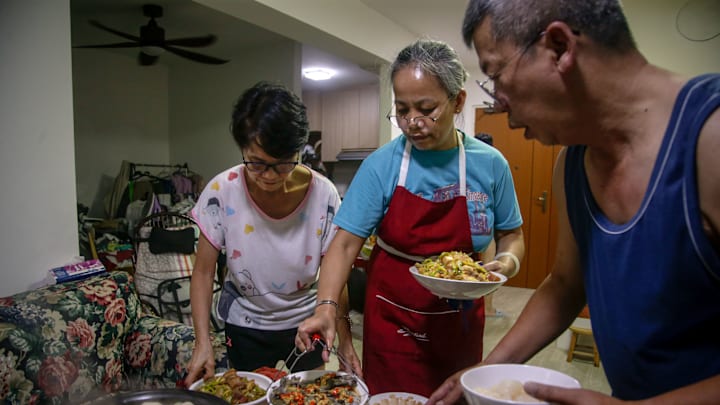The holiday season is the perfect time to gather loved ones around the table. But when it’s your turn to host guests with food allergies or intolerances, planning takes on a new level of importance. By being thoughtful and prepared, you can create a welcoming environment that ensures everyone enjoys the celebration without worry.
Hosting Guests With Food Allergies
Food allergies affect approximately 20 million people in the United States, including around 4 million children. Common allergens include:
- Peanuts
- Tree nuts
- Shellfish
- Eggs
- Dairy
- Gluten
These allergies can vary from mild reactions like hives or stomach discomfort to serious, potentially fatal reactions like anaphylaxis. The risks associated with food allergies are significant, as even trace amounts of an allergen can trigger a dangerous response.
How to Host Guests With Food Allergies
Ensuring everyone can safely enjoy your holiday feast means planning with intention and thoughtfully accommodating dietary needs. Take proactive steps to make your gathering welcoming and stress-free for everyone.
Ask Ahead About Allergies or Intolerances
Before planning your holiday menu, ask your guests about any food allergies or intolerances they may have. Common allergens like nuts and shellfish can pose serious health risks, so it’s essential to know their needs ahead of time. Clear communication helps you plan and reassure your guests that their well-being is a priority.
Label Everything Clearly
When hosting guests with food allergies, it’s crucial to label every dish correctly, especially if you’re serving buffet-style meals. This ensures everyone can easily identify which dishes are safe to eat. Include clear labels indicating the presence of common allergens such as gluten, dairy, nuts or eggs.
This helps guests with allergies or intolerances make informed choices and reduces the risk of accidental exposure to harmful ingredients. It’s a simple way to show that you’ve thought ahead to make their experience as safe and enjoyable as possible.
Take Cross-Contamination Seriously
Even trace amounts of allergens like wheat, eggs, dairy or soy can trigger a reaction, so it’s vital to prevent cross-contamination in your kitchen. Use separate utensils, cutting boards and cookware when preparing allergen-free dishes, and wash surfaces thoroughly between uses. Ensure food is kept cooler than 41° Fahrenheit to slow bacteria growth. Being meticulous during meal prep will show your guests you take their health seriously.
Plan an Inclusive Menu
Creating a menu that everyone enjoys means keeping common allergens in mind. Choose dishes that naturally avoid these ingredients or offer allergy-friendly substitutions. For example, you can use almond or oat milk instead of dairy, gluten-free flour for baked goods or sunflower seed butter as a peanut-free alternative. When you host guests with food allergies, providing safe and delicious options is key to a successful gathering.
Include Your Guests in the Process
If you’re uncertain how to best accommodate allergies, don’t hesitate to ask your guests for advice. They might have specific brands they trust or recipes they love. Some may even prefer to bring a dish they know is safe to eat. This collaborative approach helps ensure everyone has something delicious to feast on.
Include Allergy-Friendly Snacks and Drinks
Allergy considerations shouldn’t stop at the main meal. Snacks and beverages can also contain allergens like dairy, soy and gluten. Offer simple charcuterie options like fruits, vegetables or allergen-friendly crackers, and carefully check labels on drinks to ensure they don’t contain hidden ingredients like lactose or nut extracts.
Buy Premade Dishes
If cooking allergy-friendly dishes feels a little overwhelming, consider purchasing ready-made options. Many grocery stores and specialty food brands now offer allergen-free items that cater to specific needs, such as gluten-free stuffing or dairy-free desserts. For example, people with celiac disease react strongly to gluten, because it causes an immune response that harms the lining of their small intestine. Many restaurants and catering companies offer celiac-safe options so you don’t have to worry about cross-contamination.
When selecting premade dishes, carefully check the ingredient labels and look for certifications like “gluten-free” or “nut-free” to ensure the product is safe. This option saves you time and provides peace of mind that the dish has been prepared in a controlled environment, making it easier to host guests with food allergies and intolerances without the added stress of cooking everything from scratch.
Be Mindful of Hidden Allergies
Some allergens can hide in ingredients you might not expect, such as soy in sauces, traces of nuts in pre-packaged items or gluten in seasoning blends. When planning your menu, be mindful of potential hidden allergens. Even simple ingredients like broth, processed meats or store-bought dips can contain allergens.
Always double-check labels and ask guests about specific foods they avoid, especially when it comes to less common allergies like sesame or sulfites. Taking these extra precautions will ensure all your guests can indulge.
Keep Emergency Measures in Mind
While your efforts will likely ensure a safe gathering, it’s important to be prepared for unexpected reactions. If a guest has a severe allergy, ask if they carry an EpiPen and familiarize yourself with how to use it. Knowing emergency contact numbers or the nearest hospital location can provide extra peace of mind as you host guests with food allergies.
Make Everyone Feel Welcome
When you host guests with food allergies or intolerances, putting extra thought and effort into planning can make all the difference. Hosting with allergies in mind makes the meal safer, and also makes the festivities more meaningful for everyone at the table.
For more holiday tips, news and inspiration, check out the Guilty Eats holiday category.
